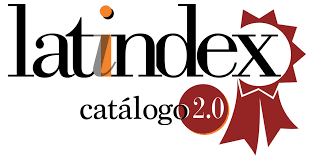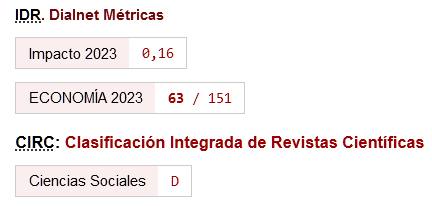El pluriverso, horizontes para una transformación civilizatoria
DOI:
https://doi.org/10.46661/rec.10143Palabras clave:
decrecimiento, buen vivir, ecofeminismo, transición, transformación socioecológicaResumen
Este artículo expone una crítica al oxímoron del "desarrollo sostenible", y también los detalles y el potencial de una agenda de investigación postdesarrollista para una transformación civilizatoria. Presentamos y discutimos tres ejemplos de alternativas al desarrollo: Swaraj Ecológico de la India, Buen Vivir del mundo indígena amazónico y andino de Latinoamérica, y Decrecimiento de Europa. Estos ofrecen pistas sobre nuestro libro titulado Pluriverso: Un diccionario del postdesarrollo (Icaria, 2019), que aspira a profundizar y ampliar una agenda de investigación, diálogo y acción para activistas, responsables de políticas y académicos, sobre diversas visiones del mundo y prácticas relacionadas con la búsqueda colectiva hacia un mundo ecológicamente sabio y socialmente justo. Este volumen puede servir como base en la búsqueda de alternativas a la Agenda 2030 para el Desarrollo Sostenible propuesta por las Naciones Unidas, en un intento de transformar verdaderamente el mundo. De hecho, es una agenda hacia el "Pluriverso": "un mundo donde quepan muchos mundos", en palabras del Movimiento Zapatista.
Descargas
Citas
Acosta, Alberto (2012): El Buen Vivir Sumak Kawsay, una oportunidad para imaginar otros mundos, Quito: Abya-Yala.
Acosta, Alberto (2016): Las dependencias del extractivismo - Aporte para un debate incompleto, Revista Aktuel Marx N° 20, Santiago de Chile: Nuestra América y la Naturaleza.
Acosta, Alberto y Brand, Ulrich (2018): Salidas del laberinto capitalista -Decrecimiento y Postextractivismo, Quito: Fundación Rosa Luxemburg.
D'Alisa, Giacomo; Demaria, Federico; Kallis, Giorgos (2015): Decrecimiento: Vocabulario para una Nueva Era, Barcelona: Icaria Editorial.
Dearden, Nick (2014): 'Is development becoming a toxic term?' The Guardian, 22/01/2014, http:// www.theguardian.com/global-development-professionals-network/2015/jan/22/development-toxicterm? CMP=share_btn_tw
Demaria, Federico; Schneider, Francois; Sekulova, Filka; Martinez-Alier, Joan (2013): 'What is degrowth? From an activist slogan to a social movement', Environmental Values Nº 22, pp. 191-215.
https://doi.org/10.3197/096327113X13581561725194 DOI: https://doi.org/10.3197/096327113X13581561725194
Escobar, Arturo (1995): Encountering Development, Princeton: Princeton University Press.
Escobar, Arturo (2011): Sustainability: Design for the pluriverse. Development Nº 54(2), pp. 137-140.
https://doi.org/10.1057/dev.2011.28 DOI: https://doi.org/10.1057/dev.2011.28
Escobar, Arturo (2015): Degrowth, postdevelopment, and transitions: a preliminary conversation. Sustainability Science Nº 10(3), pp. 451-462.
https://doi.org/10.1007/s11625-015-0297-5 DOI: https://doi.org/10.1007/s11625-015-0297-5
Gómez-Baggethun, Erik; Naredo, Jose Manuel (2015): In search of lost time: the rise and fall of limits to growth in international sustainability policy. Sustainability Science Nº 10(3), pp. 385-395.
https://doi.org/10.1007/s11625-015-0308-6 DOI: https://doi.org/10.1007/s11625-015-0308-6
Gudynas, Eduardo; Acosta, Alberto (2011): La renovación de la crítica al desarrollo y el buen vivir como alternativa, Utopia y Praxis Latinoamerica Nº 16(53), pp. 71-83.
Gudynas, Eduardo (2011): Buen vivir: today's tomorrow, Development Nº 54(4), pp. 441-447.
https://doi.org/10.1057/dev.2011.86 DOI: https://doi.org/10.1057/dev.2011.86
Hornborg, Alf (2009): 'Zero-sum world', International Journal of Comparative Sociology Nº 50(3-4), pp. 237-262.
https://doi.org/10.1177/0020715209105141 DOI: https://doi.org/10.1177/0020715209105141
Inglehart, Ronald (1990): Culture Shift in Advanced Industrial Societies, Princeton: Princeton University Press.
https://doi.org/10.1515/9780691186740 DOI: https://doi.org/10.1515/9780691186740
Kallis, Giorgos (2015): 'The Degrowth alternative', Great Transition Initiative, http://www.greattransition.org/publication/the-degrowth-alternative.
Kothari, A. (2013): Missed Opportunity? Comments on two global reports for the post-2015 goals process, Pune: Kalpavriksh and ICCA Consortium, 2013. http://www.un-ngls.org/IMG/pdf/Kalpavriksh_and_ICCA_Consortium_-_Post-2015_reports_critique_-_Ashish_Kothari_July_2013.pdf
Kothari, A. (2014): Radical ecological democracy: A way for India and beyond, Development, 57(1), pp. 36-45.
https://doi.org/10.1057/dev.2014.43 DOI: https://doi.org/10.1057/dev.2014.43
Kothari, Ashish; Demaria, Federico; Acosta, Alberto (2015): Buen vivir, degrowth and ecological swaraj: alternatives to development and the green economy. Development Nº 57(3), pp. 362-375.
https://doi.org/10.1057/dev.2015.24 DOI: https://doi.org/10.1057/dev.2015.24
Kothari, Ashish; Salleh, Ariel; Escobar, Arturo; Demaria, Federico; Acosta, Alberto (2019): Pluriverso: Un diccionario del posdesarrollo. Barcelona: Icaria Editorial.
Kothari, Ashish; Salleh, Ariel; Escobar, Arturo; Demaria, Federico; Acosta, Alberto (2019): Pluriverse: A Post-Development Dictionary. Delhi / New York: AUF - Tulika / Columbia University Press.
Latouche, Serge (2009): Farewell to Growth, London: Polity.
Martinez-Alier, Joan (2002): The Environmentalism of the Poor: A Study of Ecological Conflicts and Valuation, Cheltenham: Edward Elgar.
https://doi.org/10.4337/9781843765486 DOI: https://doi.org/10.4337/9781843765486
Meadows, Donella H.; Meadows, Dennis L.; Randers, Jørgen; Beherns III, William W. (1972): The Limits to Growth, New York: Universe Books.
Metz, Thaddeus (2011): Ubuntu as a moral theory and human rights in South Africa. African Human Rights Law Journal Nº 11(2), pp. 532-559.
Mies, Maria (1986): Patriarchy and Accumulation on a World Scale, London: Zed Books.
Mies, Maria; Bennholdt-Thomsen, Veronika (1993): The Subsistence Perspective, London: Zed Books.
New Economic Foundation, NEF (2008): A Green New Deal: Joined-up policies to solve the triple crunch of the credit crisis, climate change and high oil prices. Green New Deal Group, New Economics Foundation, Available at http://b.3cdn.net/nefoundation/8f737ea195fe56db2f_xbm6ihwb1.pdf.
Naciones Unidas (2015): Transformar nuestro mundo: la Agenda 2030 para el Desarrollo Sostenible, Naciones Unidas.
Naredo, José Manuel (1987): La economía en evolución. Historia y perspectivas de las categorías básicas del pensamiento económico, Madrid: Siglo XXI de España.
Naredo, José Manuel (2015): Raíces económicas del deterioro ecológico y social. Más allá de los dogmas, Madrid: Siglo XXI de España.
Naredo, José Manuel (2011): Reflexiones sobre la bandera del decrecimiento. Viento Sur 118. Disponible: http://www.elrincondenaredo.org/Biblio-2011-Reflexiones%20sobre%20la%20bandera%20del%20decrecimiento.pdf
Pérez Orozco, Amaia (2014): Subversión feminista de la economía: aportes para un debate sobre el conflicto capital-vida. Madrid: Traficantes de Sueños.
Poerksen, Uwe (2004): Plastic Words: The Tyranny of a Modular Language, Penn State University Press.
Quijano, Aníbal (2014): Cuestiones y Horizontes - Antología Esencial - De la dependencia histórica-estructural a la colonialidad/decolonialidad del poder. Buenos Aires: CLACSO.
Ramírez-Cendrero, Juan Manuel (2017): Limites y contradicciones del postdesarrollismo como inspiración heterodoxa frente al desarrollo capitalista. Revista de Economía Critica Nº 24, pp. 20-35.
Rahnema, Majid; Bawtree, Victoria (1997): The Post-Development Reader. London: Zed Books.
Rist, Gilbert (2003): The History of Development: From Western Origins to Global Faith, Expanded Edition, London: Zed Books.
Sachs, Wolfgang (1996): Diccionario del desarrollo. Una guía del conocimiento como poder, PRATEC, Perú, (primera edición en inglés en 1992).
Salleh, Ariel (1997): Ecofeminism as Politics. London: Zed Books / New York: Palgrave.
SDSN (2013): An Action Agenda for Sustainable Development, Report for the Secretary General, Sustainable Development Solutions Network.
Shiva, Vandana (1989): Staying Alive: Women, Ecology and Development, London: Zed Books.
Shrivastava, Aseem; Kothari, Ashish (2012): Churning the Earth: The Making of Global India, Delhi: Penguin Books India.
Sousa Santos, Boaventura (2009): A Non-Occidentalist West? Learned Ignorance and Ecology of Knowledge. Theory, Culture and Society Nº 26(7-8), pp. 103-125.
https://doi.org/10.1177/0263276409348079 DOI: https://doi.org/10.1177/0263276409348079
Swyngedouw, Erik (2007): 'Impossible/undesirable sustainability and the post-political Condition', en J.R. Krueger and D. Gibbs (eds.), The Sustainable Development Paradox, New York: Guilford Press, pp. 13-40.
Tortosa, Jose Manuel (2011): Mal desarrollo y mal vivir - Pobreza y violencia escala mundial, en Acosta, Alberto y Martínez, Esperanza (editores), Serie Debate Constituyente, Quito: Abya-Yala.
Trainer, Ted (1985): Abandon Affluence!, London: Zed Books.
UNEP (2011): Towards a Green Economy: Pathways to Sustainable Development and Poverty Eradication, A Synthesis for Policy Makers, Nairobi: United Nations Environment Programme, www.unep.org/greeneconomy
United Nations (2013): A New Global Partnership: Eradicate Poverty and Transform Economies Through Sustainable Development, The Report of the High-Level Panel of Eminent Persons on the Post-2015 Development Agenda, New York: United Nations.
United Nations (2015): Transforming our World: The 2030 Agenda for Sustainable Development, New York: United Nations. Disponible en: https://sustainabledevelopment.un.org/post2015/transformingourworld/publication
United Nations Secretary-General's High-level Panel on Global Sustainability (2012): Resilient People, Resilient Planet: A future worth choosing, New York: United Nations.
Ziai, Aram (2015): Post-development: Pre-mature burials and haunting ghosts, Development and Change Nº 46(4), pp. 833-854.
https://doi.org/10.1111/dech.12177 DOI: https://doi.org/10.1111/dech.12177
Descargas
Publicado
Cómo citar
Número
Sección
Licencia
Derechos de autor 2021 Federico Demaria, Alberto Acosta, Ashish Kothari, Ariel Salleh, Arturo Escobar

Esta obra está bajo una licencia internacional Creative Commons Atribución 4.0.
Esta licencia permite a terceros compartir (copiar y redistribuir el material en cualquier medio o formato) y adaptar (remezclar, transformar y crear a partir del material para cualquier finalidad, incluso comercial), siempre que se reconozca la autoría y la primera publicación en esta revista (La Revista, DOI de la obra), se proporcione un enlace a la licencia y se indique si se han realizado cambios en la obra.







